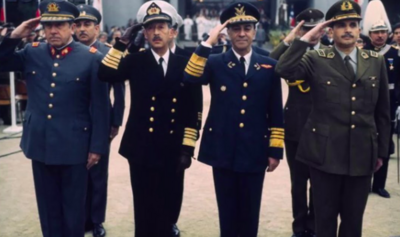2003 Creeperian coup attempt
The 2003 Creeperian coup d'état (Creeperian – Creeperian: Գոլպե դե Եստադո Ծրեեպերիանո դե 2003; Creeperian – Iberic: Golpe de Estado Creeperiano de 2003), also sometimes referred to as The Coup (Creeperian – Creeperian: Ել Գոլպե; Creeperian – Iberic: El Golpe), The Restoration (Creeperian – Creeperian: Լա'Րեստորածիօն; Creeperian – Iberic: La'Restoración), and 18–J (Creeperian: 18–Ջ), was a military coup d'état in Creeperopolis that deposed the totalitarian government of Emperor Alfonso VI. On 18 June 2003, after four years of totalitarian rule, overt government corruption, political unrest, severe hyperinflation, and surging crime rates, the Creeperian Armed Forces, lead by Chief Field Marshal Augusto Cabañeras Gutiérrez, Chief Admiral Edmundo González Robles, and Chief General Arturo Merino Núñez, seized power in a coup d'état and established a short-lived transitionary military junta. The coup had the support of the government of Quebecshire and the Intelligence Directorate of Quebecshire (DRQ) which sent financial aid and military advice to the Creeperian Armed Forces.
Alfonso VI was proclaimed as Emperor in 1999 following the death of Romero III. During his reign, the Creeperian economy suffered severe hyperinflation, two unpopular treaties were signed with Mara Salvatrucha and the Militarist Front for National Liberation, and the government was clouded by several scandals, most notably Marapolitics. His regime was and has since been labeled as totalitarian, and many have criticized his reign during and after the regime.
During the coup, the army, navy, and air force attacked the Council of Mayors building in San Salvador during a meeting of Alfonso VI with his government ministers and high ranking loyalist mayors. Many were killed or later executed. The San Salvador Imperial Palace and other important government buildings were secured by the armed forces with little to no resistance from imperial guardsmen. The military declared martial law in the wake of the coup and a 10:00 p.m. curfew was initiated across the country.
The armed forces established a military junta and initiated large-scale purges of political and military officials. Cabañeras Gutiérrez gained significant power following the coup and is considered to be one of the most powerful people in Creeperopolis. The military proclaimed Alfonso VI's second and oldest surviving son, Alexander II, as the new Emperor, but the military held absolute authority and control until he was coronated on 15 September 2003 and the junta was officially dissolved. The military, however, continues to hold significant power and influence in Creeperian politics and national governance.
The coup marked a watershed moment in Creeperian history and began the true modernization of the nation and the resurgence of its economy. The coup has been proclaimed by Creeperian propaganda as an event which saved the nation from its impending demise and allowed Creeperopolis to "catch up" with the rest of the world.
External links

|
LCN Wiki has media related to the 2003 Creeperian coup d'état. |
- 2003 Creeperian coup d'état (NSIndex; 22 September 2019)
- 2003 Creeperian coup d'état (IIWiki; 2 March 2020)








